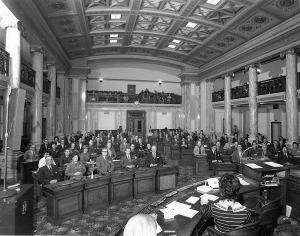Indian Education: A Continuing Legacy

Constitutional Conventional delegates in House chambers, 1 December 1971, unidentified photographer. Montana Historical Society Photo Archives, Helena. ID No. PAC 86.15-71218.2
In 1972, 100 elected delegates from all over Montana came together in Helena to rewrite the state’s constitution. Bozeman Delegate Dorothy Eck, a longtime political activist who later served as a state senator, after hearing convincing testimony from Earl Barlow, volunteered to introduce an amendment that would call attention to Montana’s rich and diverse native heritage by making a commitment to promote awareness of this heritage through public education. After a decisive 83-to-1 vote, the convention passed the amendment, which states that “[Montana] recognizes the distinct and unique cultural heritage of American Indians” and “is committed in its educational goal to the preservation of their cultural integrity.”
While Montana took an unprecedented step in including this important language in its constitution, the amendment remained a mandate in name only for more than 30 years. The amendment as passed in 1972 provided no stipulations for public funding to ensure that the state meet its educational goal of preserving Montana’s Indian heritage. This important piece of the process was initiated in 1999 when State Representative Carol Juneau, a member of the Blackfeet tribe, took the lead in putting the amendment into action. Juneau authored a bill that made four provisions to clarify the legislative intent behind the amendment:
- Reaffirm the 1972 constitutional language.
- Mandate that every Montana public school student learn about the distinct and unique heritage of American Indians in a culturally responsive manner.
- Direct state and local schools to work with Montana tribes to develop appropriate curriculums regarding American Indian culture and heritage.
- Mandate that all public school personnel have knowledge of American Indian tribes and cultures in Montana and are provided the means to acquire this knowledge.
This bill was finally passed by the state legislature in 1999 and became known as the Indian Education for All Act (IEFA). Since then Indian Education for All has been becoming a reality in public schools throughout Montana.
At the time of the convention, Earl Barlow held the position of Director of Indian Education in the office of the State Superintendent of Public Instruction. In the video clips presented in this section, hear Dr. Barlow recount details of how Montana came to include this unique perspective on American Indians in its constitution.







